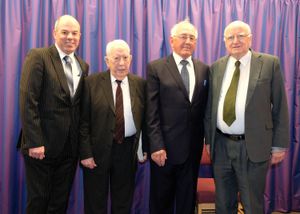‘But when it pleased God to reveal his Son in me…’ (Galatians 1:15) – this was in God’s appointed time, and according to God’s predestinating will. When Paul starts off this brief account of his conversion by saying, ‘But when it pleased God’, etc. then he is throwing us back to the previous few verses, where he has just given a vivid outline of his old life ‘in the Jews’ religion’. That life was one of unmitigated zeal from its earliest days, and, most assuredly, one of its chief characteristics was the measure of persecution directed against the young church. When due consideration is given to that ‘link’ we are confronted with a powerful demonstration of the total sovereignty of God.
In Acts chapter 9 verse 31 – as a kind of footnote to the conversion of Saul of Tarsus – we read these words, ‘Then had the churches rest throughout all Judea and Galilee and Samaria, and were edified; and walking in the fear of the Lord, and in the comfort of the Holy Ghost, were multiplied.’ Without one shadow of a doubt, the removal of Saul of Tarsus from his rampaging persecutions against the young church had a profound practical effect upon the church. ‘Then had the churches rest throughout all Judea,’ etc. By the removal of the ‘hammer of the churches’ God granted the churches rest, and edification, and increase.
The question arises: Why had God not done that sooner? Why had he not converted Saul of Tarsus earlier on in his rampaging work? What about the martyr blood and the imprisoned saints? There is only one answer to such questions, and it is the one that Paul himself gives, by the Holy Spirit: ‘But when it pleased God … to reveal his Son in me…’ It is all down to ‘the good pleasure of God’; to God’s appointed time for all the affairs of this world, and his church, as well. It is not as though God was suddenly overtaken by the rise of a great persecutor and had to quickly step in and claim him for the church he was persecuting. The apostle covers any such ‘explanation’ of the fact: ‘But when it pleased God, who separated me from my mother’s womb…’ Long before Saul of Tarsus had ever turned his attention against the followers of Christ he was already a ‘chosen vessel’ in the Lord’s sight. So the Lord told Ananias as he sent him to the newly-converted Saul; the Lord’s apostle here confirms that fact in his own words.
The conversion of Saul, although it has many unique features about it in accordance with God’s purposes, was not effected outside the general rules of God’s salvation to men and women. That is, it is always in God’s appointed time and it is always in accordance with God’s predestinating will.
There is great practical comfort and strength to be drawn from God’s workings in Saul’s conversion. It is a demonstration of Christ’s word that he will build his church and the gates of hell will not prevail against it. Our Lord spoke in one parable about what a ‘wise master builder’ was like. He was one who surveyed the work at hand and made sure he had all needed materials before he started to build. He himself is no less wise in building his church. Not only will he add each living stone, but he will add the stones at his own precise time – and he already has them ‘set aside’ in all the counsels of his grace from all eternity. Saul of Tarsus was like a sword of slaughter against the cause of God. But God reached down and took the sword, plunged it into the fire, and brought forth a sickle to reap a harvest to the praise of his name; and he did it when it ‘pleased’ him. We must bow to the sovereign will and workings of God; whether we do or not, he will still perform them.

















